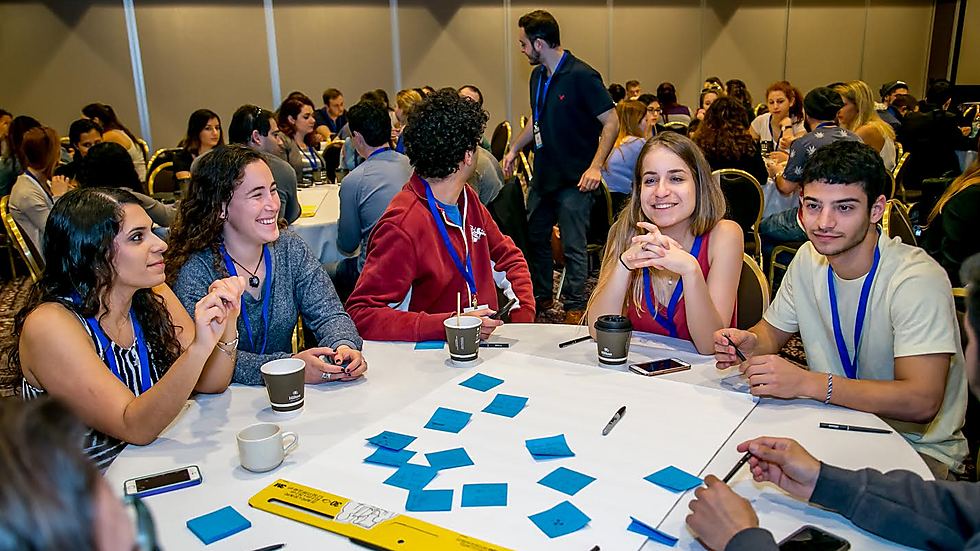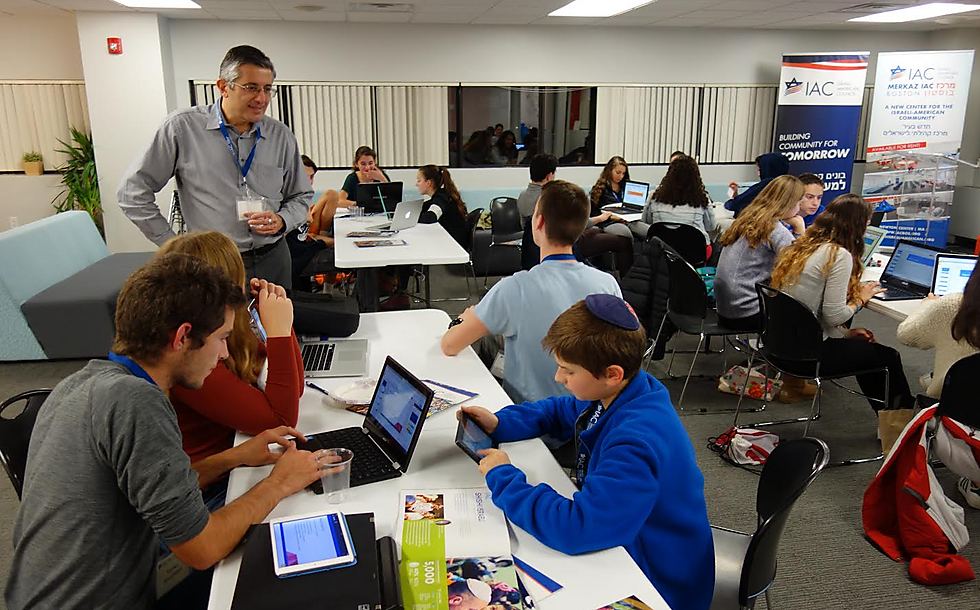
Israeli Americans assimilate more than US Jews
There are almost one million Israelis living in the Diaspora, but their failure to connect to the local Jewish communities has led to high assimilation rates among the second generation. Now, fearing for their children’s future, they are reconnecting to Judaism, to Israel and to the local Jewish community.
This painful monologue comes from an Israeli who has been living in New York for more than 20 years now. He, and many others who emigrated from Israel, thought that their built-in Jewish identity would be passed on to the next generation, but life in the United States and the failure to connect to the local Jewish community pushed the second generation far away—not just from the Jewish identity, but also from the connection to Israel.

The estimated assimilation rate of Israelis in the US is 75 percent—much higher than the assimilation rate among local Jews. Considering the fact that there are hundreds of thousands of Israelis living in North America, the numbers are particularly high.
Prof. Lilach Lev Ari, an expert on migration and ethnic identity, explained, “Most Israelis who immigrated to the US define themselves as secular and are not affiliated with any secular or religious Jewish organizations. When these people lived in Israel, they resided in an area with permanent Jewish characteristics in their day-to-day life: the community, the Hebrew language, the educational system, national holidays. That’s not the case abroad. When they move, Israeli immigrants find themselves in a pluralistic society, in which they must redefine their Jewish and Israeli identity.”
One of the solutions to this phenomenon should have been an automatic connection between Israeli immigrants and the large Jewish community in the US. For decades, however, no connection was created. Surprisingly, there was even serious alienation between the two sides.
“For the Israelis,” Lev Ari explains, “the local Jewish communities are perceived as different in their customs and in their activities, and there are many cultural differences. When the Israelis were asked whom they felt more similar to, the answer was local Americans, not Jews. The Israelis felt this was the Diaspora Jewry, and they were unfamiliar with all the feelings of Jewish communities in the Diaspora, like the feeling of a minority and dealing with anti-Semitism. They were not used to being a minority or labeled ‘Jews.’”
A natural connection has not been created on the Jewish community side, either. There are congregations that have felt no need to take Israelis in, and no efforts have been made in that direction. Quite often, the cultural gaps have even created a negative image of the Israelis, and the local community has been reluctant to embrace them.
20-year alienation
Aya Shechter, who has been living in New Jersey for about a decade, says that “the alienation between the Israeli and the Jewish communities began in the years when emigrating from Israel was seen as a very negative thing. Comments like ‘a fallout of weaklings’ (as late Prime Minister Yitzhak Rabin referred to Israeli emigrants) reflected the fact that Israelis see a person who decided to live abroad as someone who is doing something negative.
“On the other side of the ocean, in the Jewish community, people were educated that Israel is the Jewish people’s national enterprise—and that the best thing they could do is immigrate to Israel,” Shechter adds. “They didn’t know how to accept a phenomenon of people taking in the opposite path, from Israel to the US. They thought that the Israelis’ place should not be in America, and the connection between the sides failed.”
The alienation was created mainly between secular Israelis and the Jewish community. Religious or traditional Israelis who immigrated to the US searched for religious institutions and Jewish schools for their children, thereby creating better connection points with the local community.
Working on Judaism on a daily basis
Shelly, a young Israeli-American woman, explains, “In Israel, everyone celebrates the holidays. Everyone connects to something in the tradition. Here, in America, you actually have to do something to express your Jewishness and maintain it.” This quotation provides an initial idea about the significant difference between secular Jews in Israel and secular Jews in the Diaspora.
“In the United States, you have to work hard to preserve your Jewishness,” another Israeli tells us. “You have to invest time and financial resources. Israelis find it difficult to understand why you have to pay the synagogue to be a congregation member, because in Israel everything is free.
“The Jewish schools cost tens of thousands of dollars a year as well, and many Israelis prefer to send their children to public schools, especially in areas where they are considered relatively high-standard. Israelis who were not used to spending money on ‘Jewish’ activities in Israel are having trouble adjusting to this financial investment.”
Hagai Elitzur, a senior director at the Ministry of Diaspora Affairs, adds that “the main difference between being a Jew in Israel or abroad is the passivity. In Israel, you wake up in the morning and you have a pulse, so you’re Jewish. Abroad, you have to work on it and put efforts into it. If you don’t put an effort into it on a daily basis, including financial and mental resources, it will disappear.”
“The Jewish community realized that the Israelis were its ‘new blood’ and growth engine,” Elitzur continues. “We in Israel began realizing that too. There are a million Israelis in the Diaspora—in other words, about 10 percent of Diaspora Jewry are Israelis. The perception today is that they are a target audience of the Ministry of Diaspora Affairs as well, and we need platforms to develop the Israeli community so that we don’t lose it.”
‘We’ll lose our children’s Jewishness’
A leap forward by 20 years to the current era places both sides in a different position. The generation of parents sees the children losing their connection to Israel and to Judaism, and on the other hand, the changes and the openness of the local Jewish community lead to a recognition that the Israelis are here to stay and that the community should connect to them and find common ground.
According to Shechter, the change began 10 years ago, when the Israelis started creating local initiatives and organizations. Following the changes, some say that a new denomination was born in the US Jewry. The local Jews realized that Israelis were Jews too, and it’s a process which took a long time to mature.”
The Israeli-American Council was established in 2007 in its initial version. About four years ago, it changed its name to IAC and embarked on more extensive activity in a bid to strengthen relations with Israel, and to reinforce unity between US Jewish citizens and their ties to Jewish organizations. The organization engages in social activities, Hebrew studies, initiatives related to Israeli and Jewish identity, and more.
“I want my children to continue what I’m doing today,” says Shechter, the IAC’s New Jersey regional director. “The goal is to preserve Israeliness and Jewishness. Israelis are experiencing assimilation in a serious manner, and we don’t know how to pass heritage on to our children. When Israelis began immigrating to the US, they were not connected to Israel or to the community, but these things are changing.”
Recently, in a meeting with members of an Israeli delegation on behalf of the Gesher Institute and the Ministry of Diaspora Affairs, Shechter explained, “I realized that if we don’t take the matter into our hands, we’ll lose our children’s Jewishness. I suddenly realized that Jews all over the world know basic Judaism, and I don’t. I knew that things had to be different. If I let my children go on like this, they will be disconnected. I don’t want them to be. Judaism is important to me. American Jewry is important to me, and so is the children’s future.”
According to IAC co-founder and CEO Shoham Nicolet, the initiative’s rationale is based on “our unique added value in being able to talk ‘Israeli’ and ‘American’ and turn our community into a living bridge within the Jewish community. Our connection to Israel, to the language and to everything that ‘Israeliness’ has to offer turns our community into a strategic asset for the State of Israel and for the Jewish community.”
‘Ashkenazim assimilate more’
Lev Ari, the migration and ethnic identity expert, explains that over the years, there has been a change in relations between the Israeli and Jewish communities. “The emphasis is on the second generation of the Israeli immigrants, so as not to lose their connection to Judaism,” she says.
“The parents’ generation is very concerned about assimilation, and the current connection to the Jewish community is their reaction to this phenomenon. There is, by the way, a difference between Ashkenazim and Sephardim. Ashkenazim assimilate more. The Sephardim are more traditional and tend to maintain relations with local Jews for the sake of community relations.”
Asked what triggered the change, Lev Ari replied, “Over time, changes happen. As an Israeli, you accept the fact that you are there and now you think forward: Who is your community and who will you be with. The group that has already been there for decades has more time for communality. In the eyes of the Jewish community, Israelis give the community a younger, supporting spirit. It’s possible that there is a mutual need here. In the US, the sides have undoubtedly gone through a phase of building a relationship.”
Shechter addressed the change of negative perception in Israel of their compatriots who have emigrated, saying, “On the personal level, I was not criticized for the decision to move nearly 10 years ago. I feel that what has really changed is that in the past, when I would visit, people would ask me much more when was I coming back. Today, there are more people who tell me that they would like to experience life outside of Israel themselves.
“I believe that the experience of living outside of Israel is enriching and important, and that whoever returns to Israel after spending a long time abroad brings back connections, tools, knowledge and ideas which enrich society in Israel. I also think that many Israelis accept the fact that there is an advantage in having Israelis abroad who are helping Israeli companies open doors in local markets.”
(Translated and edited by Sandy Livak-Furmanski)













